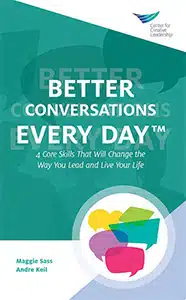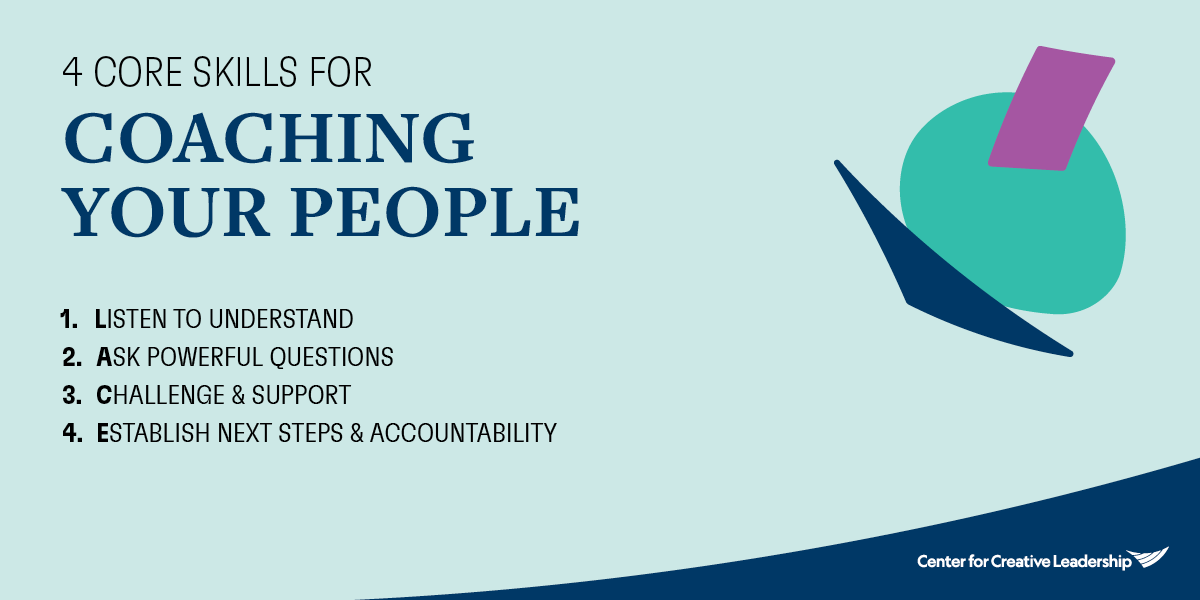You know you need to coach your employees. If they perform well, you perform well.
And if you aren’t currently measured on your “ability to develop and coach others” — that’s likely to change soon.
Coaching provided by outside experts continues to be important and valuable, but increasingly, organizations are looking at skill-building for coaching people as a vital tool for developing talent and meeting performance goals. And managers play the key role.
The problem is that leaders are being held accountable for developing others, but few are taught best practices for coaching others. So they end up giving reviews and giving advice, but they don’t really understand how to have a coaching conversation with their people.
That’s why we’ve been partnering with client organizations to help them develop leader-coaches who understand how to be an effective coach, outlining specific actions for coaching people well.
How to Coach People Using LACE
4 Core Skills for Coaching Others Effectively
At CCL, our coaching methodology is based on research and our over 50 years of experience coaching others in organizations around the world. We believe that whether you’re a professional leadership coach, or a leader with coaching responsibilities, you need to build both your skill at coaching others and the relationship itself.
Unlike some coaching models that can be convoluted and theoretical, the 4 core skills we teach for coaching people effectively ensure that in the moment, you’re not trying to remember a concept or a theory, but have pragmatic guidance to follow. Just remember LACE, our acronym for the 4 core skills for holding conversations that coach others:
- Listen to Understand
- Ask Powerful Questions
- Challenge and Support
- Establish Next Steps and Accountability
1. Listen to Understand.
Listening starts with paying close attention, repeating back concepts to build understanding, and summarizing what you hear. But listening to understand goes beyond these active listening techniques for coaching others.
Listening to truly understand someone starts with recognizing that multiple levels of information are conveyed in a conversation: facts, emotions, and values. Naturally, when listening, you pay attention to the facts being discussed. But listening to understand also means paying attention to other levels. Listen too for the values behind the matter at hand, as well as the emotions that people feel. Notice not only their words, but also the tone of voice, body language, beliefs, and what seems to be most important for the other person. Coaching others well requires that you listen for all 3 levels, and you will really be listening to understand the other person’s perspective.
2. Ask Powerful Questions.
This is really the ability to ask courageous questions, moving the conversation forward, and provoking new insights, rather than just providing them for the other person. Making non-directive inquiries that draw out more information and stretch the other person’s thinking is a learned skill that must be practiced. Examples of powerful questions include:
- What else could you do?
- Who else have you talked to about this?
- Who else is affected in this situation?
- How do you want the rest of the team to feel about this?
Beyond creating mutual understanding about facts, asking powerful questions like these when coaching others can help uncover insights and unspoken reservations that wouldn’t have come to light otherwise.
3. Challenge and Support.
We all need our thinking challenged at times. Challenge can stress-test ideas, yield productive dialogue, and uncover unexamined assumptions. It can lead to stronger, shared understanding.
Ultimately, coaching people is about getting them to try something different from what they have done before, or creating a significant shift in perspective. It’s about uncovering answers through inquiry, openness, and exploration, and there usually aren’t quick fixes.
But challenging someone is only effective when combined with the right amount of support. You must show that you’ve truly listened to the other person and understand their feelings and values. A challenge should be offered within an environment of safety. Taken too far — or offered at the wrong moment and without sufficient support — challenge can cause damage.
When done well, challenge builds trust and encourages honesty and transparency, rather than triggering defensiveness.
4. Establish Next Steps and Accountability.
Having an effective conversation is only one aspect of successful coaching. The real work happens later when insights are applied and new behaviors are tried. The skill of creating accountability lies in creating clear, specific, and meaningful actions.
Connect conversations to action by establishing next steps (“So, I’ll send you an email by Friday, letting you know how it went”). This ensures that the value, insights, and decisions created by a coaching conversation aren’t lost.
The goal of a conversation is always that those involved walk away with a shared understanding of what they discussed, and conversations like these increase the chance of successful follow-through that creates growth and fosters courageous actions that lead to meaningful change.
“CCL’s program helped me take a step back to see from a different angle how I listen, ask questions, provide feedback and support. 80% of the program is the practical part, so you can start improving immediately.”
Strategy Development, JTI
Better Conversations Every Day Participant
To Coach People, Focus on the Relationship
Leader-coaches can aim for transformation, even in 10-minute hallway conversations.
But creating the right relationship is critical. This ensures you have a safe, trusting, and productive space for conversations where you coach others.
At CCL, we believe effective leaders “bring their whole selves to leadership.” To be a leader-coach, focus on boosting your self-awareness, showing vulnerability and empathy, and creating an environment of psychological safety. In addition, set a foundation of high ethical standards and ground rules of agreement.
Once you have the tools and some practice with the 4 core conversation skills under your belt, you’ll find that coaching people through conversations are an effective way to develop and motivate your direct reports. And you will benefit, too; as you improve your skill at coaching others, you’re developing leadership capabilities that have benefits in other work relationships as well. A manager’s ability to build relationships, elicit information, challenge assumptions, support others, and clarify goals goes a long way in helping you to succeed as a leader.

Learn how to communicate better, connect more deeply, build trust, and be more satisfied — inside and outside of work — with our book, Better Conversations Every Day.
Create a Culture of Coaching Others By Scaling Conversational Skills
Coaching people can have both an individual and organizational impact. Helping individual leaders build the conversational skills they need to coach others effectively is the first step toward implementing a coaching culture across your entire company.
Our philosophy is that everyone in an organization benefits when people are using coaching skills every day. Enabling the 4 core skills of LACE creates better conversations that create a common language, a better foundation, and a stronger platform on which to build other enterprise-wide initiatives.
Once these 4 core skills for coaching others permeate everyday conversations, they enable leaders to build stronger relationships and enhance a culture of psychological safety, increase engagement, and foster development.
Organizations that want to truly scale a coaching culture will also want to:
- Offer everyone access to developing skills at coaching others, no matter where they sit in the org chart.
- “Seed” the organization with role models who coach people well.
- Link coaching outcomes to business goals.
- Coach senior leadership teams.
- Recognize and reward coaching behaviors.
- Integrate coaching others with other people-management processes.
Ready to Take the Next Step?
Participants in our coach training for leaders learn how best to coach people. Or, your organization can partner with us for conversational skills training and help scale a culture of coaching others across your entire organization.











